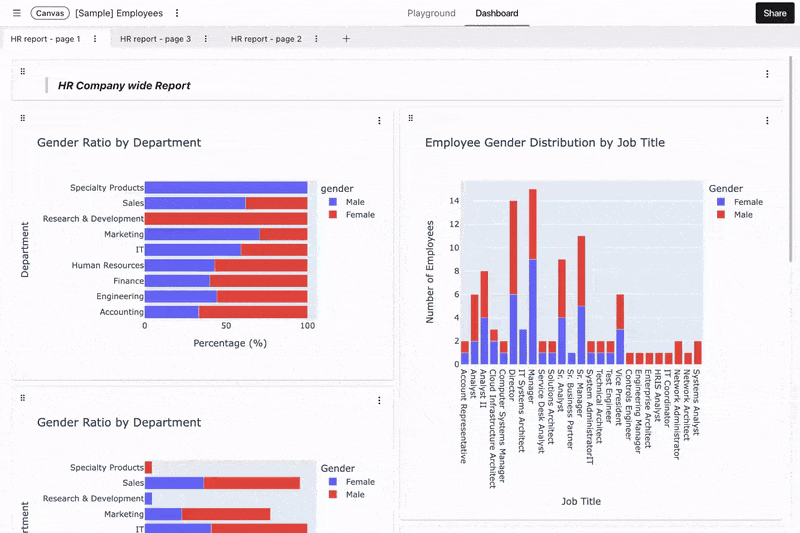The Data Democracy Revolution

DX and data-driven management
Digital transformation (DX) is transforming business processes in companies and bringing about significant changes in the indicators used as a basis for management decisions. A particularly significant change is data collection and utilization. The goal of a DX strategy is not just to introduce tools, but to utilize data to formulate management strategies and optimize business processes. DX has made it possible to collect data from areas that could not — or were extremely difficult to — be collected from historically.
Democratization of data: an organization where people can access the data they need, when they need it
Data democratization refers to the necessary people — whomever they may be — being able to access the necessary data at the necessary time. This 'democratization of data' is so important because it enables each team/department/office to quickly make decisions on the specific needs and issues of that team/department/office.By creating the right data access environment, employees in the field and managers in each department can find the insights they need to do their jobs, share them with the rest of the company, and quickly implement solutions and improvement plans.
Learning from Workman on the importance of data analysis and democratization
Japanese DIY and construction retailer Workman's success story is a striking example of how the democratization of data is crucial to the growth of a comp

Before 2012 Workman had more than 700 shops, but no stock control; stock and financial data was only updated once a year through annual stocktaking. Determining what products were selling well relied on an inefficient method whereby supervisors travelled around the shops and visually checked products on the shelves. The company was seen as having taken up all market share in the workwear market and there was little room for growth.To overcome this situation, Workman adopted a strategy of management by numbers and data, with all employees using Excel. Under this policy, all processes — from internal discussions, idea proposals, personnel evaluations, and even management decision-making — became data-driven. As a result, the company has achieved phenomenal growth, with 10 consecutive quarters of record profits.In 2022, they took their evolution even further, moving from Excel management to data analysis using Python and the introduction of a BI tool called Amazon QuickSight. The role that Excel had played in the past had its limitations, and new tools were needed to enable larger-scale data aggregation and complex analyses to be carried out quickly.The combination of Python and BI tools enables frontline employees to derive more relevant and rapid insights into the challenges they faced on a daily basis. Workman's previous strategy and the major shift in the company's approach provide a great learning experience about the importance of utilizing data.
Why data governance is essential for 'data democratization'
Data governance refers to a framework governing data quality, security, privacy, and usage rules. In particular, the following items are three pillars of data democratization: clarification of the purpose and use of data management, maintenance and understanding of distributed internal data, and the division of roles and regulations regarding who has access to what data and in what way.
- Clarifying the purpose and use of data managementClarifying the purpose for managing and using data is a cornerstone of data governance. This involves a process of defining why data is being collected, how it will be analyzed and used, and what value can be derived from it. Without clarity of purpose, data may not be utilized properly, which can lead to problems related to data quality and security.
- Maintaining and understanding distributed internal dataIn many organisations, data is dispersed across different departments and systems. To effectively maintain and understand distributed data, organizations need to adopt a consistent data model and naming conventions across the organization, and establish processes to maintain data quality. This includes data classification, metadata management, and data cleansing.
- Roles, regulations, and accessProperly managing access rights to data is essential to protect security and privacy. Role-based access control (RBAC) is a common way of ensuring that users only have access to the data required for their tasks. By establishing role-based access rights and rules, it prevents unauthorized use of data and reduces the risk of data breaches. These elements are interrelated and provide the foundation for safe and efficient data democratization. In addition, there remain many other important initiatives in building data governance — such as improving data analysis literacy among all employees, meeting compliance requirements, and continuously monitoring data quality — which need to be overseen and promoted.
Where Morph comes in

Morph was developed as no-code data management tool to promote data democratization.Morph has the features and performance of other BI tools that place it above mere spreadsheets, such as the ability processing large volumes of data and easy integration and linking of data sources. However, where Morph truly excels is the data-handling power it gives even the least tech-savvy employee in an organization.With the ability to collaborate in real-time on a single project, the Morph AI tools allowing for data visualization and parsing through natural-language prompts, and simple but granular access control, Morph ensures that everyone in your company can maximize their data.